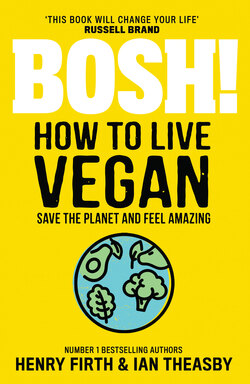Читать книгу BOSH! How to Live Vegan - Henry Firth - Страница 28
WHAT ABOUT THE FARMER?
ОглавлениеA note from Ian
I grew up in a reasonably big city. I love cities. I like their vibrancy, the people, the history, the architecture and the energy. Having said this, I also love the countryside. I was lucky enough to spend a good chunk of my childhood in a small (and I mean very small) village called Gunthorpe.
My grandparents, Charlie and Winnie, owned and ran a small arable farm there. I have many fond memories of that farm. The memories mostly revolve around my grandma’s wonderful cooking, but also exploring the old farm buildings and riding around in my grandad’s tractor as he ploughed fields, planted seeds and harvested crops.
I look back now, and realise that my grandfather worked bloody hard. All farmers do. When I say ‘worked bloody hard’ I don’t mean, ‘I got to the office at 9am, hammered out some emails then had lunch, had a meeting, smashed out a couple of spreadsheets and was home for 6.30pm.’ I mean, ‘I woke up at 4.30am, headed to one of my huge fields, smashed out some back-breaking labour until it got too dark to carry on, got home for 10pm, went to bed and hit repeat the next day. Every day.’
I understand how hard farmers work and I’ve got nothing but the utmost respect for their tremendous work ethic. However, having said that, I wholeheartedly believe that some of the practices used in farming need to be re-evaluated and reformed. As the UK edges ever closer towards a more vegan way of life, and demand for vegan products grows and demand for non-vegan products declines, it’s absolutely essential we give our farmers the tools, education and incentives they need to adapt and thrive. We need to work with farmers to harness their unquestionable and inspiring work ethic and experience, and include them as a big, important part of the inevitable switch to plant-based living.
We’ve been talking a lot about meat, but we shouldn’t ignore our sea-dwelling friends either.
Half of all marine life has been lost in the last 40 years[51] and 87% of fish populations are fully or over-exploited.[52]
We’ve already killed 90% of big ocean predatory fish,[53]and it’s been predicted that our world will run out of saltwater fish by 2048.[54]
Increasing sea temperatures have destroyed coral reefs and all coral reefs are projected to be lost by 2050.[55]
Fishing is also a grossly inefficient way of eating; for every 1lb of fish caught, up to 5lb of unintended marine species are caught and discarded as by-kill.[56]
